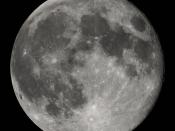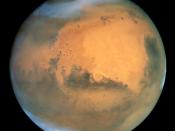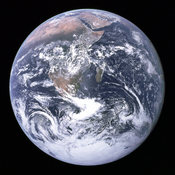Space Exploration
The limitless region of outer space lies before us, awaiting discovery and exploration, but there is concern about the cost of space exploration. Although it does cost a lot of money, the long-term advantages of space exploration and colonization can be quite effective and helpful. If we continue to use fossil fuels and minerals at the rate we're going we won't have much left for the future. Also, the population of the Earth is growing and overpopulating quickly. With further space exploration we may be able to find a way to terraform Mars or the moon. This would allow us to form another civilization that possibly has more minerals to serve the people living on it and on Earth. It would also decrease the population of Earth. The long-term advantages of this would be greater than the cost of space exploration.
We always knew Mars as our "Sister Planet" because of the many similarities it has with Earth.
It has all the necessary elements to support life: frozen water at the ice caps; carbon and oxygen in the form of carbon dioxide; nitrogen. The similarity in which Earth existed billions of years ago and Mars presently is amazing. When the Earth was first formed, no oxygen existed on our planet and it, too, looked like a desolate, unlivable planet. The atmosphere was made entirely of carbon dioxide and nitrogen. It wasn't until photosynthetic bacteria developed on Earth that enough oxygen was produced to allow for the development of animals. Similarly, the thin Mars atmosphere today is almost totally composed of carbon dioxide. There are a few Martian features that are close enough to Earth's to consider it for habitation. One being, Mars has the rotation rate of 24 hours and 37 minutes which is only about 30 minutes...


